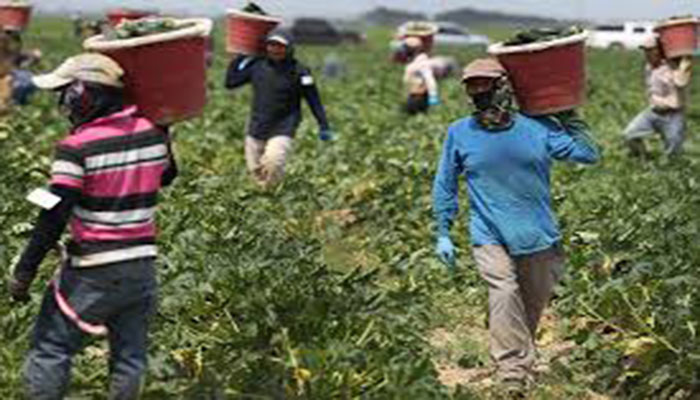Labour leaders call for ensuring social security for agricultural workers
Labour rights activists and agriculture workers at a consultation demanded speedy legislation on labour laws and social security nets in the agriculture sector.
The Sindh Community Foundation (SCF) and the Human Rights Commission of Pakistan (HRCP) organised regional stakeholders’ dialogue on gaps and challenges regarding laws for protecting the women agriculture workers. Speakers at the event pointed out that lack of rules of business was the main hurdle in the implementation of the Sindh Women Agriculture Workers Protection Act 2020.
Sindh Labour Secretary told the event that the Sindh government was committed to improving the conditions of labour in the province and urged the labour rights organisation to identify gaps in the law.
He said Sindh was leading among the other provinces in terms of legislation after the 18th amendment.
HRCP Co-chairperson Asad Iqbal Butt said women labourers working in the agriculture sector worked in very hot weather amid poor health and safety measures. He added that the social structure was also involved in the exploitation of rights of the agricultural workers in the province.
“All the labour rights organisations should work together; there is a lot of need to work on women empowerment in all sectors,” he said.
Acknowledging the Sindh government’s pro-workers legislation, SCF’s Javed Soz said cotton workers were working in working conditions and landowners did not provide them facilities. “Therefore, they need to be included in social security and other social support schemes,” he said.
He suggested that a portion of the social security amount should be provided by the government as the agriculture workers received unfair wages and earned low income to feed their family members.
Expressing concern over poor and slower implementation of laws in Sindh, Mahnaz Rahman of the Aurat Foundation said the registration of female agricultural workers should be initiated.
Nasir Mansoor of the National Trade Union Federation said the law for the women workers of the agricultural sector had ambiguities and loopholes and it overlapped with the Sindh Industrial Relations Act that gave workers the right to association.
He said procedures and rules had not been placed yet which was a necessary part of the law.
According to Mansoor, only 620,000 labourers were registered and only 300,000 had access to social security. He suggested that the government may impose a 1 or 2 per cent tax on producers and factory owners to compensate the amount for the social security of workers.
Zulfiqar Shah of the Pakistan Institute of Labour Education and Research, Shahnaz Sheedi of the South Asia Partnership Pakistan, Nagina Junejo and others also spoke at the consultation.
A committee comprising labour rights organisations was also formed to interact with the government for improvements in laws.
A group of young girls from cotton workers’ families also performed a theatre at the event in which they
depicted worst conditions of female cotton workers.
-
 Inside Channing Tatum's Red Carpet Return After Shoulder Surgery
Inside Channing Tatum's Red Carpet Return After Shoulder Surgery -
 Ryan Coogler Brands 'When Harry Met Sally' His Most Favourite Rom Com While Discussing Love For Verstality
Ryan Coogler Brands 'When Harry Met Sally' His Most Favourite Rom Com While Discussing Love For Verstality -
 Sarah Pidgeon Explains Key To Portraying Carolyn Bessette Kennedy
Sarah Pidgeon Explains Key To Portraying Carolyn Bessette Kennedy -
 Justin Bieber Rocked The World With Bold Move 15 Years Ago
Justin Bieber Rocked The World With Bold Move 15 Years Ago -
 Sam Levinson Wins Hearts With Huge Donation To Eric Dane GoFundMe
Sam Levinson Wins Hearts With Huge Donation To Eric Dane GoFundMe -
 Kate Middleton Steps Out First Time Since Andrew Mountbatten-Windsor's Arrest
Kate Middleton Steps Out First Time Since Andrew Mountbatten-Windsor's Arrest -
 Inside Nicole 'Snooki' Polizzi's 'private' Marriage With Husband Jionni LaValle Amid Health Scare
Inside Nicole 'Snooki' Polizzi's 'private' Marriage With Husband Jionni LaValle Amid Health Scare -
 Germany’s Ruling Coalition Backs Social Media Ban For Children Under 14
Germany’s Ruling Coalition Backs Social Media Ban For Children Under 14 -
 Meghan Markle Shuts Down Harry’s Hopes Of Reconnecting With ‘disgraced’ Uncle
Meghan Markle Shuts Down Harry’s Hopes Of Reconnecting With ‘disgraced’ Uncle -
 Liza Minnelli Alleges She Was Ordered To Use Wheelchair At 2022 Academy Awards
Liza Minnelli Alleges She Was Ordered To Use Wheelchair At 2022 Academy Awards -
 Quinton Aaron Reveals Why He Does Not Want To Speak To Wife Margarita Ever Again
Quinton Aaron Reveals Why He Does Not Want To Speak To Wife Margarita Ever Again -
 Prince William And Kate's Photos With Andrew Used In New Campaign Against Royals
Prince William And Kate's Photos With Andrew Used In New Campaign Against Royals -
 Touching Eric Dane Moment With Daughter Emerges After Viral Final Words
Touching Eric Dane Moment With Daughter Emerges After Viral Final Words -
 Kate Middleton Quietly Backs Princess Beatrice, Eugenie As Andrew Scandal Intensifies
Kate Middleton Quietly Backs Princess Beatrice, Eugenie As Andrew Scandal Intensifies -
 Michael B. Jordan Shares His Thoughts On Growing Trend Of Live-action Anime Adaptations
Michael B. Jordan Shares His Thoughts On Growing Trend Of Live-action Anime Adaptations -
 Why Mikaela Shiffrin Celebrated Olympic Gold With Taylor Swift Song?
Why Mikaela Shiffrin Celebrated Olympic Gold With Taylor Swift Song?




